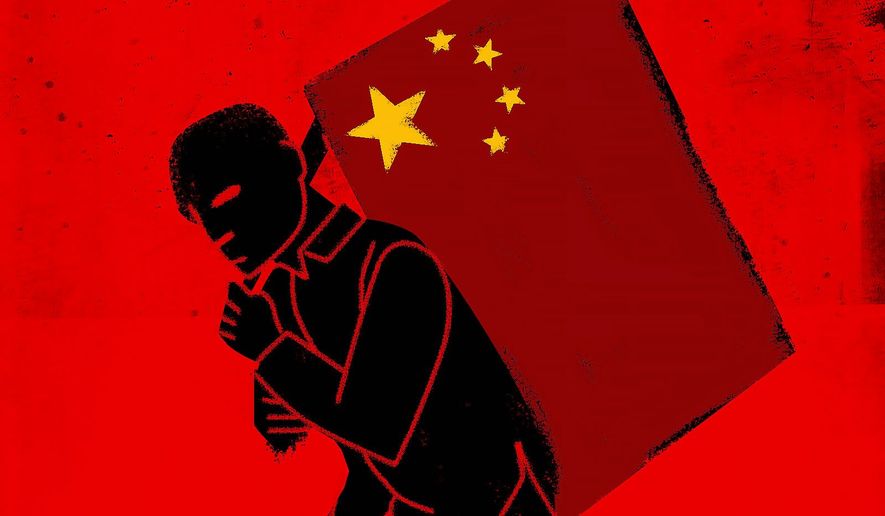OPINION:
Just last month, President Joe Biden gave a rallying speech about his efforts to put human rights at the center of American foreign policy. Unfortunately for the President, his colleagues in Congress are refusing to walk the walk. With well over one million people detained, the scale of concentration camps and slave labor in Western China has become increasingly undeniable. Despite this, efforts to keep U.S. taxpayer funds from reaching those who build and run the camps have been watered down in the Democrats’ Build Back Better reconciliation bill. Mr. Biden needs to exercise leadership amongst his own ranks and make it clear that American taxpayers won’t fund slavery or its accomplices.
The Chinese government’s persecution of predominantly Muslim minorities in the western Xinjiang province has been meticulously well documented. Reeling off a litany of horrors, particularly against the Uyghur people, earlier this year, then-Secretary of State Mike Pompeo designated the campaign as a collection of crimes against humanity, akin to those of the Second World War. Since taking office, Secretary Antony Blinken has similarly called out China’s ongoing genocide against the Uyghurs.
While these atrocities are occurring in a far-flung region of China, the use of forced labor – an internationally recognized form of modern slavery – has produced export goods that have reached American shores and stores. Recent investigations have highlighted how global supply chains for cotton, consumer electronics, and solar panels are potentially rife with Chinese slave labor.
Indicative in the size of the market for fair trade goods, it’s no surprise that American consumers care about how and where their products are made. In response to the ongoing Uyghur scandal, Congress and the federal government have gradually sought to stop slave-made goods from reaching the American market. The Uyghur Human Rights Policy Act of 2020 sanctions individuals or entities involved in human rights violations against the Uyghurs or other ethnic minorities.
Additionally, the U.S. Customs and Border Protection has banned the import of tomato and cotton products from Xinjiang and any products containing materials sourced from a major silicon producer that supplies solar panel manufacturers. The Department of Commerce has also blacklisted 53 entities over their role in various human rights abuses in Xinjiang.
Despite these moves, the authors of the Democrats’ reconciliation bill seem to be crafting a loophole that would allow companies involved in the construction of Chinese concentration camps to receive federal contracts. Title IX of the reconciliation bill provides several billion dollars for energy and climate research. Eagle-eyed observers have spotted that in the September 27th version of the bill, section 90027 prohibits using these funds to “contract, subcontract, grant, or loan” to companies that are found to be constructing or operating internment camps or providing or operating mass surveillance technology in Xinjiang.
However, an updated version of the bill, dated November 3rd, removes the restriction. To add insult to injury, the bill retains a $5,000,000 grant to the Department of Energy’s Office of Economic Impact and Diversity. The cruel irony is that this little outfit within the Department seeks to, among other things, “expand the inclusion and participation of individuals in underserved communities, such as…formerly incarcerated persons.” It beggars belief that the Department is committed to helping the formerly incarcerated by using taxpayer dollars to fund the side-hustles of Chinese slave drivers and their collaborators.
When it comes to fighting modern slavery and climate change, the current Congress has a commitment problem. The details of the much-beleaguered but eventually-passed infrastructure bill present another unfortunate example. Section 40436 of the bill requires that the Secretaries of Energy, State, and Commerce study the impact of Chinese forced labor on the electric vehicle supply chain within 120 days of the bill’s enactment.
While some might argue that this provision is better than nothing, it risks creating the appearance of doing something without mandating tangible consequences or transparency. Compare the requirement with some of the other studies that the bill demands. Section 40434, for example, compels a much-merited study on the consumer costs and job losses associated with Mr. Biden’s decision to scrap the Keystone XL pipeline. But this study must be completed in 90 days and with a report submitted to Congress. Instead of calling for prompt accountability to Congress on the issue of Chinese slave labor, the infrastructure bill bent over backward to mandate the bare minimum.
In his self-congratulatory speech last month, Mr. Biden was right when he said that, “demonstrating that our commitment to human rights begins at home is among the most powerful and persuasive tools in our foreign policy kit.” Unfortunately, the President’s colleagues in Congress are doing their very best to cut loopholes for the very worst.
U.S. taxpayer dollars should not boost the profits of companies that are facilitating slave labor or building and operating concentration camps. America can build back better without resorting to the help of slave drivers and their accomplices.
• Oliver McPherson-Smith writes for the American Consumer Institute, a nonprofit educational and research organization. For more information about the Institute, visit www.TheAmericanConsumer.Org or follow us on Twitter @ConsumerPal.




Please read our comment policy before commenting.